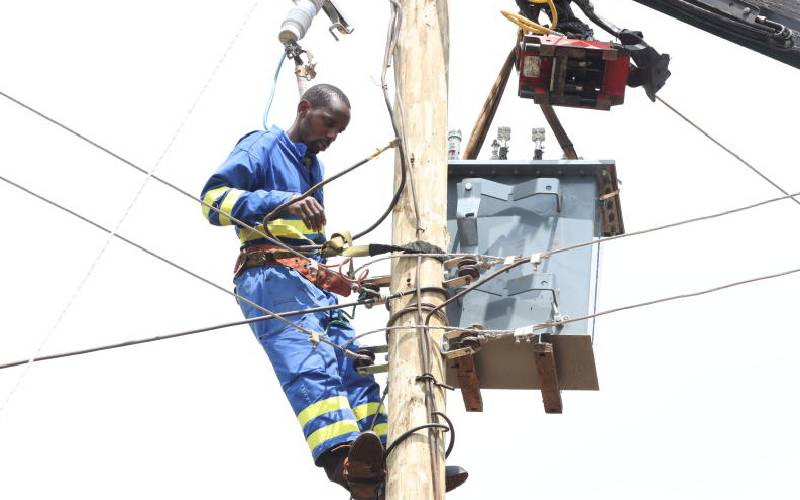My friend and colleague Amos Kareithi was accosted by thugs outside Bobmill factory last Friday.
He was waiting for the bus that had delivered him there to drive off, so that he would cross the busy Mombasa highway and report for work, when a grey saloon vehicle pulled over and two men jumped out.
One flashed a badge and introduced himself as a policeman. Before Amos could say Shetani Shindwe, a second man emerged. The two dragged him into the vehicle where three more men waited.
How could six people fit in the car, I asked, to which Amos retorted in his characteristic wit: He was not allocated sitting space.
Amos strongly suspects that the thugs had trailed him from Kitengela, where he had withdrawn a substantial amount from a bank. He even believes the thugs were working in cahoots with bank staff.
Do not be surprised if I tell you that’s not surprising. Yet another friend had narrated having undergone a similar ordeal years back after drawing a substantial amount from another bank in Industrial Area.
What I find surprising is how ordinary citizens conducted themselves in Amos’s case.
There were three people waiting at the bus-stop when Amos was abducted. None of them raised a voice, or even alerted the police, as far as we can tell.
Perhaps that shouldn’t surprise us in the least. Individualism is slowly gaining acceptance in our country, and we are no longer our brothers’ keepers.
After an hour and a half doing the rounds, a journey that Amos estimates could have been covered in half an hour if we had decent traffic flow on city roads – and lessened the pain of having shoes over his face – he was abandoned near the Syokimau Railway Station.
The first person Amos encountered is a woman who, to use singer Ray Charles’s words, had the soul of a pillowcase. She flatly declined his request to call for help at The Standard.
It is ordinary folk like you and I who couldn’t come to his rescue when he was accosted by criminals; and it is self-same folk who could not extend a helping hand when sought help.
Airport police
Amos recounts encountering General Service Unit officers manning the airport.
He says they were professional and humane. One offered his phone and gave him money for bus fare, and directed him on how to get to the nearest police station.
Stay informed. Subscribe to our newsletter
But that’s when his worst humiliation started. Police played a game of ping-pong so that Amos spent the next six hours being pushed from one station to another. From JKIA to Embakasi to Industrial Area police station.
Those manning each station claimed the matter was not under their jurisdiction, although they wear badges that proclaim Utumishi Kwa Wote (service to all).
Covering the distances between the three stations is arduous. One can hardly do it using public means.
There was no point agonising about catching up with the criminals; police were simply not interested in that.
But there is something we rarely acknowledge collectively, yet our individual experiences increasingly point to that concrete conclusion: We have subjected our policemen and women to dehumanising work conditions.
They return the favour when we seek their services.
Amos says he experienced more humanity from the thugs. They left him unharmed, if quite traumatised.
They also kept their word that they wouldn’t leave him empty handed. So after stealing his Sh95,000, they left him Sh500 in the pocket!
A missing tooth, a crowing rooster and Kenya Power’s gift of darkness
Talk about power supply being liberalised to end Kenya Power’s dominance has produced very positive results.
First off, the firm decided to open their offices at 6.30am, and used a crowing rooster in their marketing posters. But I experienced their newfound energies at a personal level.
Power supply was disrupted along Arboretum Drive on Tuesday evening, which lasted through the next 18 hours.
The young man of the house, Tumaini, reported hearing a loud bang, a story that was corroborated by the daytime guard at the apartment complex.
The guard added some interesting line: Kenya Power technicians had been working on a nearby transformer when the loud bang was reported, and they rushed to our neighbourhood after power had been disrupted. But they soon left. Here’s the imagined sequence of events. Picture the men in blue overalls and helmets fiddling with wires, triggering an outage accompanied by a blast.
They arrive on our doorstep and confirm we are in the dark before returning to their (lighted) houses. Come Wednesday morning, we were running low on water that had to be pumped.
But we found a perfect excuse for Tumaini’s delayed gifts.
He lost an upper tooth on Tuesday, and since he has a Memorandum of Understanding with his grandmother, that he gets a cash token and other gifts for every tooth lost, he woke up full of expectations.
Since we had no ready gift, we blamed it on the darkness – an explanation he found satisfactory – and will appreciate more as he grows.
The making of a revolution, the Okiya Omtata style
I hear my friend Okiya Okoiti Omtata has unveiled a new vehicle, March 4 Movement, which authorities fear will be used to foment trouble from within, much the same way the Egyptian revolution that deposed Hosni Mubarak two years ago was orchestrated.
I’m not sure if the intelligence on Omtata’s intentions is accurate for, as far as I can tell, the furthest the man has gone in challenging authority has been to chain himself to the entrance of Vigilance House to protest police ineptitude.
Such acts of self-abnegation cannot be regarded as power grab, but that’s not to say State intelligence agencies are not making intelligent conclusions.
Still, I’m curious about the requirements for membership – scraggly beards surely should be one of them – so that I can act accordingly.
If some of their envisioned acts of subversion including printing critical reports on the Government, I am willing to donate acres of newsprint from years past, and lend a hand in writing more in the future.
Will that make me a revolutionary or reactionary? Perhaps that doesn’t matter, as long as one is on the right side of history. That has been the lesson from Mau Mau’s betrayed revolution, and the so-called Second Liberation.
 The Standard Group Plc is a
multi-media organization with investments in media platforms spanning newspaper
print operations, television, radio broadcasting, digital and online services. The
Standard Group is recognized as a leading multi-media house in Kenya with a key
influence in matters of national and international interest.
The Standard Group Plc is a
multi-media organization with investments in media platforms spanning newspaper
print operations, television, radio broadcasting, digital and online services. The
Standard Group is recognized as a leading multi-media house in Kenya with a key
influence in matters of national and international interest.
 The Standard Group Plc is a
multi-media organization with investments in media platforms spanning newspaper
print operations, television, radio broadcasting, digital and online services. The
Standard Group is recognized as a leading multi-media house in Kenya with a key
influence in matters of national and international interest.
The Standard Group Plc is a
multi-media organization with investments in media platforms spanning newspaper
print operations, television, radio broadcasting, digital and online services. The
Standard Group is recognized as a leading multi-media house in Kenya with a key
influence in matters of national and international interest.







